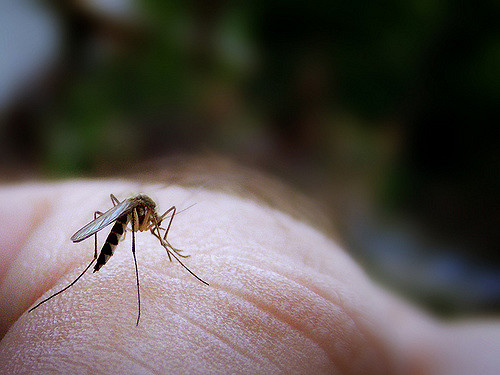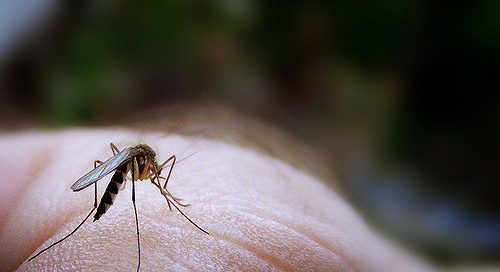It is already known that the mosquitos that bite us are almost always females (exceptions can be made for some species) since they need proteins and other nutrients in our blood in order to create eggs. Is it true that mosquitos bite some people more than others, or is this just a myth? A mere suspicion of those who wake up covered in bites?

James Jordan (CC BY-ND 2.0)
As it turns out, this may be backed up with scientific fact. Recent studies have shown that there are people who are really just irresistible to these small vampires. It has been shown that the smell of the human body attracts mosquitos since sweat contains lactic acid, ammonia and other chemicals that emit aromas which are enticing to mosquitos; in other words, a sort of mosquito-attracting perfume.
Female mosquitos are able to sense such odors with olfactory systems in their antennas, and, once detected, if our odor pleases them there will be no escaping. For this reason, if we go to the country or a forest or other places with a lot of mosquitos, it is recommendable to wear long pants and sleeves and have a good repellant on hand.
Over the past decades a number of theories have been debated: that mosquitos are attracted by chemical substances eliminated through the epidermis after drinking alcohol (especially beer), by dark clothing (especially black and red), high body temperature, floral or citric perfumes, CO2 emissions exhaled by those exercising in the outdoors, or women in the third trimester of pregnancy, etc. (however, this last theory is not relevant to the tiger mosquito or many mosquitos found outdoors). Some people are even convinced that mosquitos, given the choice, would choose someone with O- or B negative blood types over someone with A.

Photo: BigStock
The truth is that none of the previously mentioned theories are based on scientific evidence which proves them, and it is even less likely that they could be applied to all mosquito species. On the other hand, what has in fact been demonstrated is that mosquitos are attracted to the presence of certain bacteria on the skin, but only in special cases in which the microbial community is large and has very low diversity.
Over the past few years research has been advancing to discover the genetic components of the real influential factors, such as body smell, the removal of certain substances through sweat, and the presence of certain bacteria on the skin. These are differences which are detectable by mosquitos and come directly from our genes; meaning, unfortunately, that they will passed onto our children.
Of the 400 different chemical compounds excreted in human sweat, 85% have a genetic origin.
Researchers suggest that the development of genes lending to unappealing odors for mosquitos could be part of genetic evolution of natural defenses against these animals which have transmitted diseases for millions of years.
A study from 2015 published in PLOS ONE worked with nearly 40 pairs of twins: of these, 18 were identical twins sharing 100% of their genes, and 19 twin pairs shared as many genes as normal brothers or sisters of individual births. The results of the study showed that only some of the non-identical twins (one of the two individuals) were more likely to be bitten, while the mosquitos showed the same interest for identical twins, whether high or low. It is now thought that such genetically-originating factors may hold the key.
The next step is to discover the combinations of genes responsible for the particular body odors in order to know the risk of being bitten. This could lead to the development of pharmaceuticals which increase the production of natural repellents by the body instead of always relying on applying artificial products on the skin. It is important to keep in mind that these small animals infect millions of people each year with dangerous diseases such as malaria or dengue, and the incidence of these is generally highest in countries with low access to health care.
Information sources:
G. Mandela Fernández-Grandon, Salvador A. Gezan, John A. L. Armour, John A. Pickett, James G. Logan. Heritability of Attractiveness to Mosquitoes. PLoSOne, 10 (2015), p. e0122716
El País (24/4/2015): https://elpais.com/elpais/2015/04/21/ciencia/1429613571_574034.html




